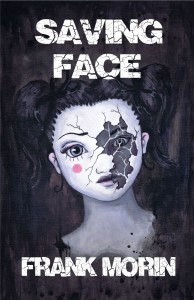I used to hate the word “branding.” It conjured up images of cattle lowing as a hot poker was pressed against their flanks; or corporate logos splashed all over slick, prepackaged boxes. I’m a creator. An individual personality. Not a brand, I thought. Not some bogus advertisement.
But branding your work – having a brand – is so important to promotion.
This story begins shortly after I’d made my first short story sale – “Blood Runs Thicker” to “When the Hero Comes Home 2” anthology by Dragon Moon Press – and I was invited by fellow DMP author Marie Bilodeau (Destiny’s Blood, Destiny’s Fall, the forthcoming Destiny’s War, and a short story in the previous “When the Hero Comes Home,” among others) to attend the Ad Astra convention in Toronto where I would have an opportunity to meet the editor who’d purchased my story.
My previous convention experiences had been one of two types: fan conventions, typically toy collecting or anime themed, where I arrived in a t-shirt proclaiming my love of the convention’s topic, or in costume; and academic conventions, where I brought out my best Subdued Suit (TM) and tried to look like a Serious Academic. I wasn’t certain a fiction editor wanted to meet my Serious Academic – it wasn’t my master’s thesis she’d purchased, after all. “What do I wear?” I asked Marie. “A suit?”
“A suit’s not necessary unless that’s the sort of image you want to present for your writing,” she said. “Think about what you want to be remembered as. Be yourself.”
Then she told me about wearing cute shoes to her first convention appearance and discovering that her footwear had become an unshakeable aspect of her public persona – to the point where wearing running shoes provoked questions about her footwear, potential foot injuries, etc. As someone who lives in Doc Martens, I was horrified.
“Just wear the usual,” she suggested.
“The usual” is ripped jeans or combat pants, a cartoon or heavy metal T-shirt, my signature army jacket, and boots. “I’ll look like I’m on my way to an Iron Maiden concert,” I protested.
I could clean up my jeans. I do own a few pairs that are hole (paint, stud, patch, funky-pattern) free. For shirts, though, I made Marie a deal: I’d provide dinner and she’d poke through my closet in search of something appropriate for me to wear.
Much to my relief, she bypassed my workwear closet entirely – that selection of puffy blouses and tailored pants that I despise and own only in the interests of keeping my day job – and dug around in my chest of drawers, producing a black shirt with a subtle Halo Helljumpers logo on it.
“That’s a gamer shirt,” I said.
“But it’s not bright or garish or obvious about it, and it’s got that military theme that runs through so much of your writing.”
Okay. I could deal with this. I had a couple more shirts that had actual military crests on them, and added those to the suitcase. “Maybe,” I joked, “I could even take my ratty army jacket.”
“Absolutely,” Marie said.
I couldn’t believe I’d heard that correctly. “What?”
“You write military science fiction. Put on that jacket and you look like someone who writes military science fiction.”
And that’s when I realized that branding wasn’t about pretending to be something I wasn’t or stuffing myself into a monkey suit and feeling miserable all day. It was about creating a recognizable, memorable statement that says this is what I do.
The public persona I was building wasn’t all fake. Those were my real clothes in that suitcase–clothes I felt good in. The brand, I realized, was an aspect of myself – an aspect that puts its best foot forward and hasn’t got holes in its jeans, but a genuine part of my personality nonetheless. At TFCon I’ve been recognized for years as “the one in the army jacket.” There was definitely something to this branding business. It was a visual shorthand for what could be expected of me.
Ad Astra was a great success, and ever since then I’ve stopped thinking of branding as covering myself with a slick veneer and started thinking of it as a way to celebrate who I am and what I do. I write military science fiction. I have a background that includes two pilots’ licenses, a degree from the Royal Military College of Canada and seven years of contracts to back it up.
And the brand image doesn’t limit me. My most recent story sale was a steampunk romance.
I’ve added a pin with an old-fashioned compass to the lapel of my army jacket.



